 Petzlover
Petzlover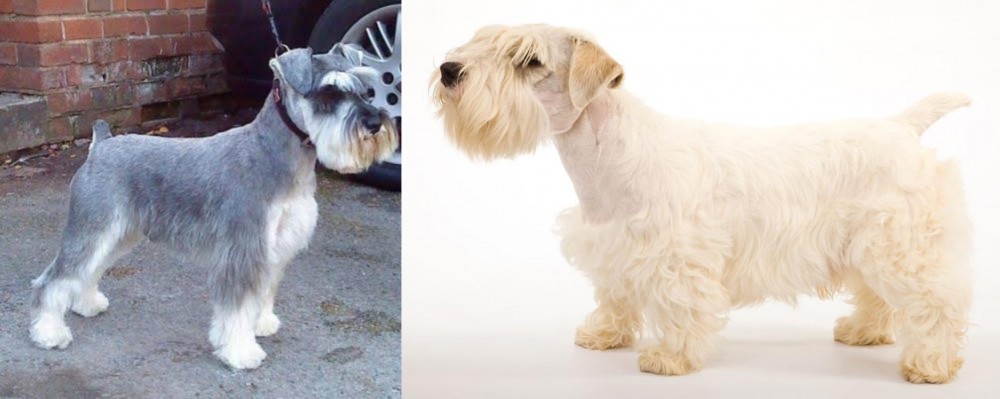 Miniature Schnauzer is originated from Germany but Sealyham Terrier is originated from United Kingdom. Miniature Schnauzer may grow 6 cm / 3 inches higher than Sealyham Terrier. Both Miniature Schnauzer and Sealyham Terrier are having almost same weight. Both Miniature Schnauzer and Sealyham Terrier has almost same life span. Both Miniature Schnauzer and Sealyham Terrier has almost same litter size. Both Miniature Schnauzer and Sealyham Terrier requires Moderate Maintenance.
Miniature Schnauzer is originated from Germany but Sealyham Terrier is originated from United Kingdom. Miniature Schnauzer may grow 6 cm / 3 inches higher than Sealyham Terrier. Both Miniature Schnauzer and Sealyham Terrier are having almost same weight. Both Miniature Schnauzer and Sealyham Terrier has almost same life span. Both Miniature Schnauzer and Sealyham Terrier has almost same litter size. Both Miniature Schnauzer and Sealyham Terrier requires Moderate Maintenance.
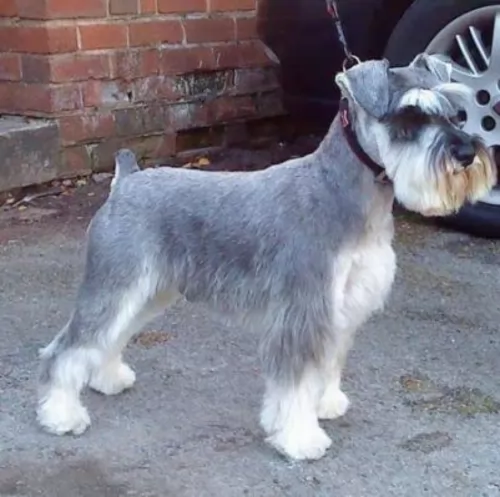 Miniature Schnauzers were first bred in Germany in the 19th century being bred from Affenpinschers and Standard Schnauzers.
Miniature Schnauzers were first bred in Germany in the 19th century being bred from Affenpinschers and Standard Schnauzers.
This dog was always used to control rats on farms, but these days he is more a companion. It is believed that the start of the modern Miniature Schnauzer in the United States was around 1924 when dogs were imported from Germany.
It was in 1933 that the Miniature Schnauzer was recognized by the AKC as a separate breed from the Standard Schnauzer.
 The Sealyham Terrier is a rare dog breed originating in Wales. The dog was developed in the 19th century by Captain John Edwardes at Sealyham House. The Sealy has been associated with members of the British Royal Family, but its numbers declined to such an extent that it was listed as a vulnerable native breed by the Kennel Club.
The Sealyham Terrier is a rare dog breed originating in Wales. The dog was developed in the 19th century by Captain John Edwardes at Sealyham House. The Sealy has been associated with members of the British Royal Family, but its numbers declined to such an extent that it was listed as a vulnerable native breed by the Kennel Club.
The Sealyham Terrier club was created in 1908 and the dog breed was officially recognised by the Kennel Club in 1911. This dog is now recognized by all the major kennel clubs. The American Sealyham Terrier Club was founded in 1913.
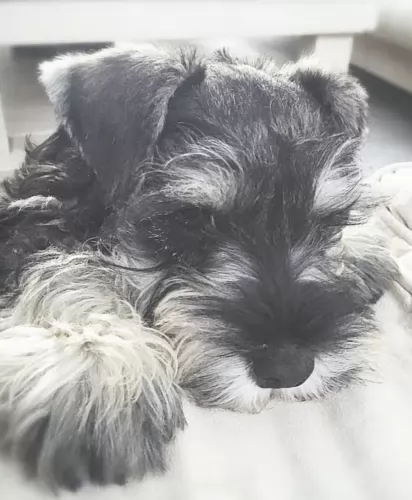 The Miniature Schnauzer is a small dog breed that stands between 30 to 36cm in height and weighs between 5 and 10kg.
The Miniature Schnauzer is a small dog breed that stands between 30 to 36cm in height and weighs between 5 and 10kg.
He has a sturdy body with a dense, wiry coat which most people prefer to have stripped. Because stripping is quite tedious, many of these dog owners prefer to have the coat clipped which actually gives the coat a greyish look to it.
The coat is usually a mix of black and silver. Some people refer to the Miniature Schnauzer as having a salt-and-pepper coat – hairs that are a mix of black and white. The dog has a double coat with the outer coat being wiry and the undercoat being a lot softer.
This is a dog that will need to be groomed frequently to prevent matting. A noticeable feature with these dogs is the rectangular shaped head with alert slanted eyes and bushy eyebrows, mustache and beard. In fact the word ‘Schnauzer’ means beard or muzzle.
The ears have been traditionally cropped but these days they are left and then they tend to be half-erect, half-floppy.
This is a tough little dog, fearless, cheeky, arrogant, alert and also friendly. A draw-card with him is that he is considered as a low-shedder and being hypoallergenic.
They’re very intelligent dogs too and will learn quickly when you give him training and socialization. This is important for a dog like this as he can quickly show you that he is strong willed and independent. Training and socialization makes him much nicer as he becomes more balanced and obedient.
He is full of life and extroverted and you can count on him to join you wherever you are and whatever you’re doing. Whether watching TV, swimming or hiking, he’ll be there and turn every occasion into a festive event. He is a loving, loyal dog, making a splendid pet.
He's protective of his human family and tends to be suspicious of strangers, and this is what makes him such a great watchdog.
 The Sealyham is a dog that stands low to the ground and its height shouldn’t exceed 27 - 30cm and weight should be about 8 - 9kg.
The Sealyham is a dog that stands low to the ground and its height shouldn’t exceed 27 - 30cm and weight should be about 8 - 9kg.
The double coat is considered non-shedding and is wiry and weather resistant. It is nearly always white but can be fawn. They’ve got big heads with dark, deep set eyes. The ears are semi-erect, semi-floppy and the tail is usually docked.
Affectionately referred to as Sealy, there aren't too many of these little dogs left. At one time, they were a very popular terrier breed, but today they are uncommon – almost endangered.
He’s a social dog with his human family but tends to be reserved around strangers. He also tends to be just a little bit more mellow than some of the more rowdier terrier breeds.
He gets on well with other dogs in the home as well as with children. He is an intelligent little dog but is inclined to be stubborn so you have to show him both firmness and kindness and also think about obedience training for him.
He’s amicable and adjusts well to life in the city or the countryside.
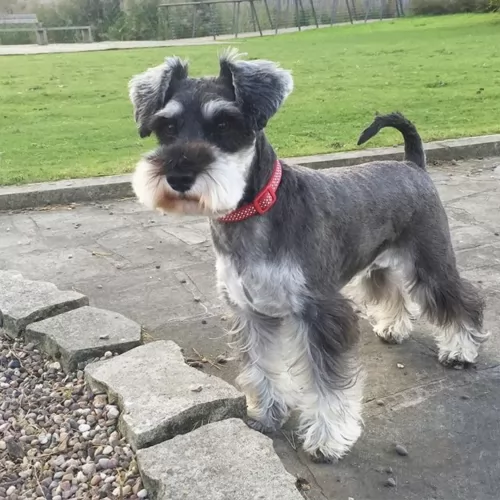 Miniature Schnauzers are such adaptable little dogs, quite happy to make a home with you in the city or in the countryside.
Miniature Schnauzers are such adaptable little dogs, quite happy to make a home with you in the city or in the countryside.
They’re sociable dogs, so just being with his human family wherever they are will suit him well. If he lives in the city however, he will need to have a walk everyday or taken to the park for a run.
He is also a dog that scarcely sheds, so he suits people battling with allergies. With an average life expectancy of 12 to 14 years, if you nurture your Mini Schnauzer and give him the best food and exercise there is, as well as loving him, you’re going to have a loyal and devoted pet.
 The Sealyham Terrier is such a robust little dog with a distinctive look.
The Sealyham Terrier is such a robust little dog with a distinctive look.
He can be stubborn but he loves his human family and is sociable and amicable with them, slotting in to their way of life. He can be a couch potato or an active outdoor dog – whatever is required of him and he makes and excellent, loving family pet and companion.
 Your Miniature Schnauzer is pretty healthy and he isn’t likely to cost you much in terms of vet fees. There are however some common dog problems that you want to be aware of such as cataracts of the eye and hypothyroidism.
Your Miniature Schnauzer is pretty healthy and he isn’t likely to cost you much in terms of vet fees. There are however some common dog problems that you want to be aware of such as cataracts of the eye and hypothyroidism.
This a a problem in the lens of the eye. The lens should be clear, and when a dog has a cataract, it obscures the vision. The size of the cataract can lead to blindness.
Diabetes in a dog can bring on cataracts as can genetics or damage to the eye from exposure to ultraviolet light. Fortunately, dogs with cataracts can still see. Dogs with old cataracts can have surgery to remove them.
When a dog owner suspects a cataract in their pet’s eye it is best to treat it immediately with anti-inflammatory dog cataract eye drops. Cataracts never go away however without surgery.
The thyroid gland in the neck produces a hormone called thyroxine. It controls metabolism, but with hypothyroidism, enough of the hormone isn’t made. Its a common disease which affects all dog breeds.
Signs of hypothyroidism include hair loss, weight gain, intolerance to cold and a troublesome skin. To have the disease diagnosed, the vet will do a series of blood tests.
 This is a hardy dog breed and you don’t hear of many health problems associated with him. It seems as though you might have to watch out for an eye condition known as lens luxation. It's an eye condition with dogs where the lens slips out of position because of weakening of the fibers that hold it in place.
This is a hardy dog breed and you don’t hear of many health problems associated with him. It seems as though you might have to watch out for an eye condition known as lens luxation. It's an eye condition with dogs where the lens slips out of position because of weakening of the fibers that hold it in place.
There is a lack of fluid in the eye causing optic nerve damage and this can lead to blindness.
Retinal Dysplasia is another eye problem . This is a developmental malformation of the retina that the dog is born with. Symptoms in dogs are a reluctance to jump off things such as the bed or he may even bump into things.
Atopic Dermatitis is something the Sealyham is more prone to. Its an allergic skin disease which drives a dog mad with its itchiness. Your pet will certainly need treatment from the vet to relieve it.
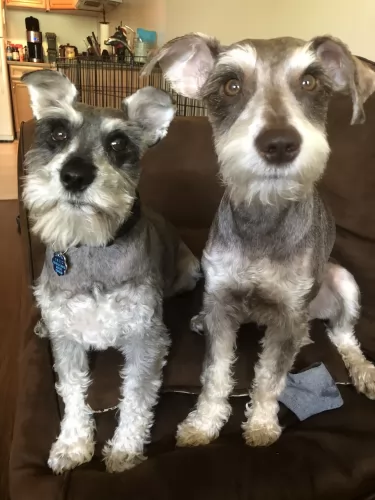 Let’s look at several ways you need to care for your Miniature Schnauzer -
Let’s look at several ways you need to care for your Miniature Schnauzer -
Make sure you have his puppy injections on time. This means knowing which veterinarian you’ll use. Later on if you don’t want to go in for breeding, you will need to have your pet spayed or neutered.
Make sure you have a nice warm, dry spot for your dog to sleep. It can be a cardboard box, or you can buy a dog basket or sleeping platform. Make sure your pet loves it and knows he can retreat to it anytime he wants.
If he goes outside for a few hours, make sure that he has a place to lie in the shade and away from the elements.
Good food promotes good health and longevity. You can feed your pet one of the top quality commercially manufactured foods and give your pet some variety by adding in some boiled chicken, vegetables and brown rice. Some raw meat occasionally can also be excellent for your pet.
 Provide your Sealy with his own warm, dry bed.
Provide your Sealy with his own warm, dry bed.
Brush the long, weather-resistant coat at least twice a week. Hand-stripping of the coat will maintain the wiry, hard texture, but because this method can be quite a laborious process, many Sealy owners rather have their dog professionally clipped.
Check inside his mouth for bad teeth as well as inside the ears for signs of infection. His eyes should also be clear and free of discharge.
His nails will also need to be trimmed.
The Sealyham doesn’t require a lot of exercise but he must at least be given a walk every day.
Ensure the vaccines are up to date. They start when your pet is just a puppy. Remember to get your dog to the vet when you suspect that he is ill.
Feed your Sealyham with good food. Make sure you’re feeding your pet a high quality food as this promotes health and longevity. Provide your Santal Hound with top quality food to ensure his health.
Always choose the quality commercially manufactured foods on the market – those that have natural, good ingredients in them. Try to include some home-made food for him which can be simply mixed into the dry kibble twice a week.
There is no need to offer your dog a host of different foods. Dogs want simplicity and consistency. Boiled chicken, brown rice or pasta and spinach, sweet potatoes and carrots is super tasty and nutritious. If you can, also try and include a little bit of raw meat to his diet occasionally as this can go towards ensuring he doesn’t get skin diseases.
Make sure that a constant supply of fresh, cool water is available to your dog.